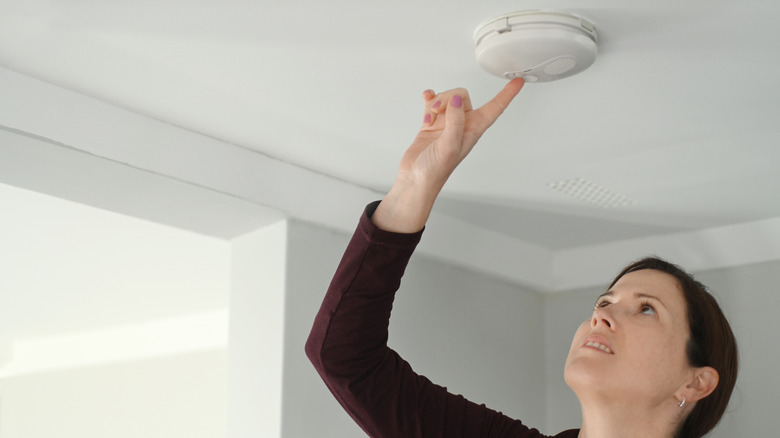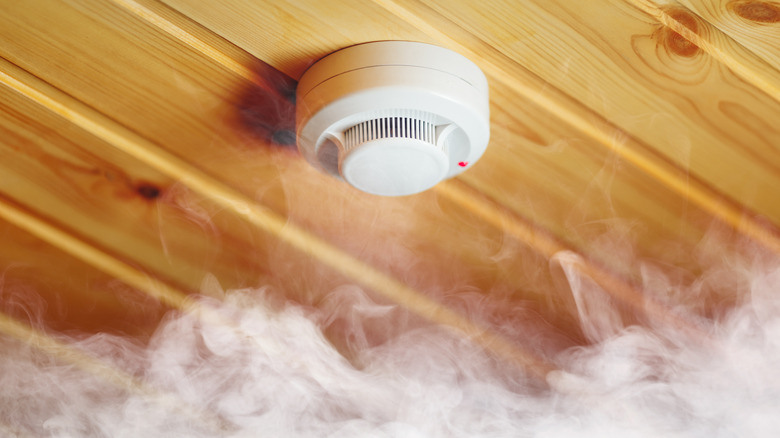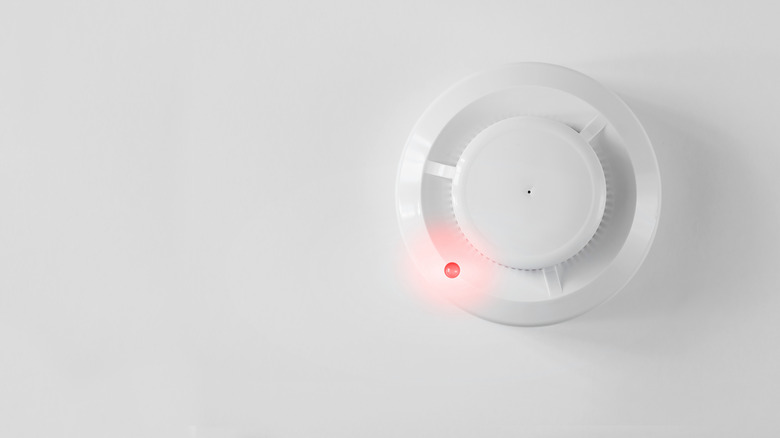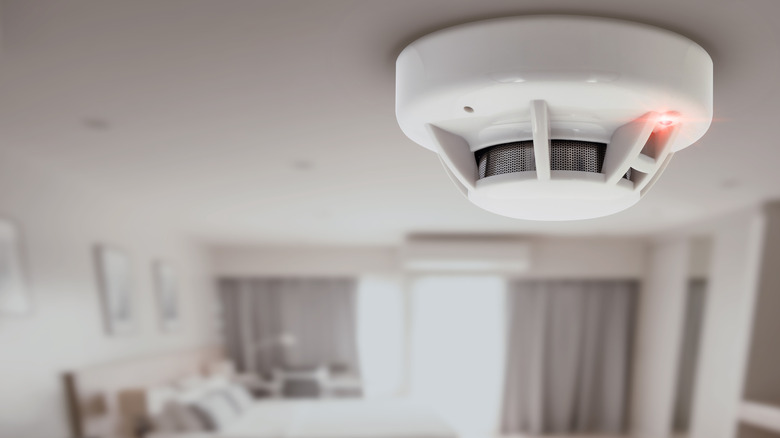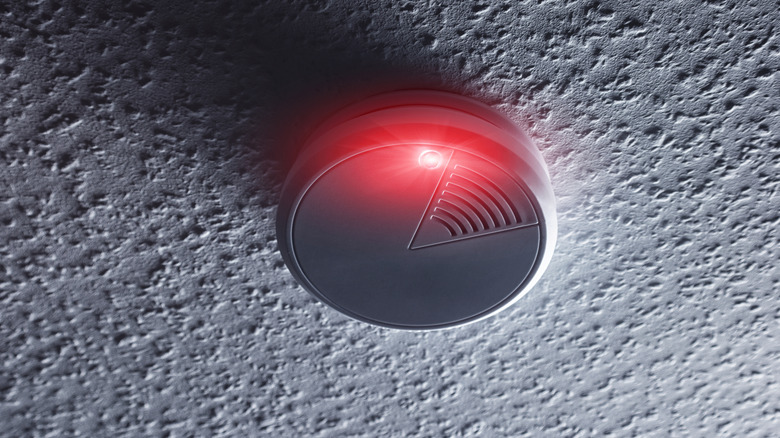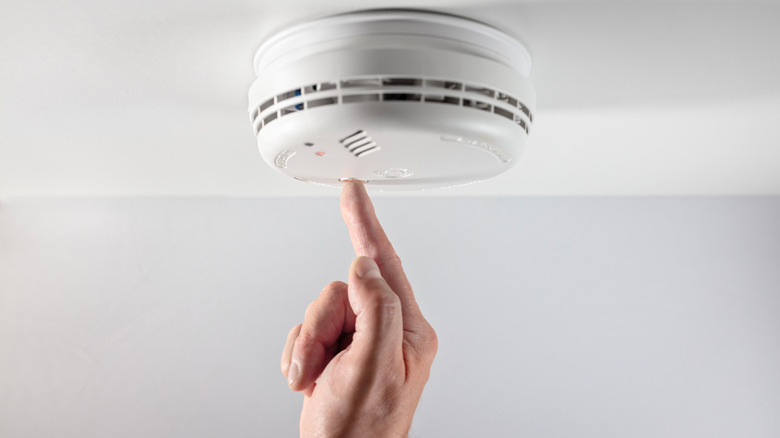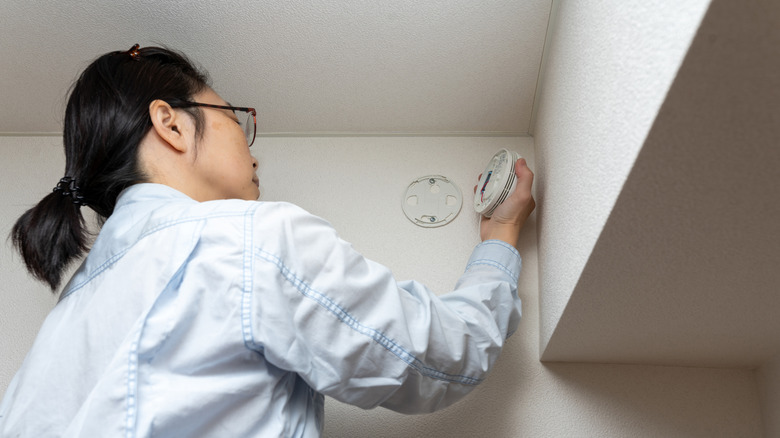6 Common Home Alarm Warning Sounds And What They Mean
Each home security system has its own set of cues and meanings, and you'll need to consult with your manual to work them out. There are, however, a few universal warning sounds used for most household smoke and carbon monoxide (CO) alarms. When one of these alarms goes off in your home, it's trying to tell you something isn't right. For example, three loud continuous beeps mean your smoke alarm is doing its job and warning you that there's smoke in your home. On the other hand, a continuous high-pitched beeping from your smoke or CO alarm indicates dangerously high levels of carbon monoxide. A single random alarm beep is usually harmless — to stop a chirping smoke alarm, you just need to replace batteries.
The point is, your alarm is designed to alert you through specific sounds and signals so you have time to act and get to safety as quickly as possible. But here's the thing, you can only respond quickly and correctly if you actually know what the alarm sounds mean. Is it a quick ping signaling a battery replacement or a more urgent sound warning that carbon monoxide has been detected in the air? If you don't know the difference between a warning siren and intermittent chirping, you'll waste potentially precious time trying to figure it out.
Three continued loud beeps
If you hear three loud beeps in a row continuously from your smoke alarm, sometimes accompanied by a flashing red light, it means smoke or fire has been detected. That's your cue to act fast. The National Fire Protection Association (NFPA) recommends getting out of your home immediately when your smoke alarm sounds three consecutive beeps. Call 911 once you're outside so firefighters can come and check things out. Don't go back inside until the fire department gives the all-clear. Re-entering too soon puts you at risk of injury, smoke inhalation, or getting stuck.
Chirping from your alarm every 30 to 60 seconds
Not every smoke alarm sound indicates immediate danger. A single chirp every 30 to 60 seconds with a blinking red light usually means the battery needs replacing. The alarm will continue until the battery dies, which isn't just annoying but also puts you at risk of missing important warning sounds. If your alarm keeps chirping even after you've replaced the battery, the NFPA says the unit is no longer functional. Get a new one. You also hear a similar single chirp when it is time to replace your carbon monoxide sensors.
Four continuous beeps
Four continuous beeps in a row — beep, beep, beep, beep — from your smoke alarm indicate that carbon monoxide, an odorless, colorless gas, has been detected. Carbon monoxide exposure can be life-threatening, with low concentrations causing fatigue and chest pain, and higher concentrations leading to dizziness, nausea, and headaches. If your smoke or carbon monoxide alarm beeps four times and continues to do so, leave your home immediately and call 911 so emergency responders can evaluate and clear the area.
Continuous high-pitched beeping
Four continuous beeps in a row isn't the only way your home's alarm system warns you that carbon monoxide is present. Continuous high-pitched beeping from your smoke or CO alarm can also indicate dangerously high CO levels. In this case, take the same precautions as you would with the four-beep alert by leaving your home immediately and moving to a safe area. Then, call 911 so emergency responders can check your home. Common sources of carbon monoxide include gas stoves, leaking chimneys or furnaces, unvented gas space heaters, and even vehicle exhaust from an attached garage.
Three beeps repeated every few minutes
Three beeps that sound continuously from your smoke alarm should always be treated as an emergency, but three short beeps that repeat every few minutes usually signal a malfunction. Three beeps spaced out over time — not continuous like the beeps indicating smoke or fire — may mean your device is glitching or experiencing an internal error. Much like any piece of technology, sometimes all it needs is a simple reset. You can usually do this by pressing the reset button for about 10 seconds or using the test button, depending on the manufacturer's instructions.
A random single beep
Does your smoke alarm randomly go off with no clear pattern at irregular intervals? It usually is not an emergency, though these beeps still require attention. The batteries may be dying, or the device could be dusty and need vacuuming or wiping with a dry cloth. You could have installed the alarm in an unsuitable location, such as a humid bathroom. Test the batteries of your home alarm once a month, replace the batteries once a year, and replace the entire alarm unit before it expires or within 10 years of the manufacturer date.
